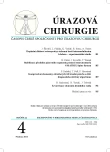External fixation of distal radius fractures
Authors:
Radomír Suchomel; Radek Veselý; Jan Trávník
Authors‘ workplace:
Traumatological Hospital Brno, Department of Traumatology, Faculty of Medicine Masaryk University Brno
; Úrazová nemocnice v Brně, Klinika traumatologie Lékařské fakulty Masarykovy univerzity Brno
Published in:
Úraz chir. 22., 2014, č.4
Overview
Aim of the study:
The authors analyse possibilities and indications for a medical treatment of distal radius fractures by an external fixation, present their own aggregate of patients treated at the Trauma Hospital Brno with an external fixator for distal radius fracture.
Material and methods:
During the years 2009-2011, we treated 45 patients for distal radius fracture by the external fixation at the Trauma Hospital Brno. There were 17 women and 28 men, the average age was 54,9 years. Functional status was evaluated with the Gartland and Wearley point-rating system. With fracture of the 23C3 type by AO, the results of patients treated by the external fixation are compared with the results of patients treated by the LCP.
Results:
In a given aggregate, we found that 5 patients had an excellent functional result, 32 patients had good and fair result and 6 were classified as poor. Regarding complications, we observed a pin-track infection in 5 cases, an algodystrophic syndrom in 2 cases and symptoms of carpal tunnel syndrom decompensation in 3 cases. Loss of primary correction was observed in 7 patients, in 3 patients it was necessary to deal with a symptomatic ulnocarpal impingement by ulna shortening osteotomy.
Conclusion:
The use of an external fixation with distal radius fractures is a method of choice for treatment of higher grade compound fractures, and for solving infectious complications or compartment syndrom. The use of an external fixation is then an alternative solution for fractures with an extensive articular surface comminution. For a good result, systematic outpatient follow-up treatment is necessary with fractures treated this way.
Keywords:
Distal radius fracture, external fixator.
Sources
1. BROWNER, BD., JUPITER, JB., ALAN M. Skeletal Trauma: Basic Science, Ma-nagement, and Reconstruction. 3rd ed. Philadelphia: Saunders 2003. 2816 p. ISBN 0-7216-9175-7.
2. EICHENBAUM, MD, SHIN EK. Nonbridging external fixation of distal radius fractures. Hand Clin. 2010, 26, 381–390. ISSN 0749-0712.
3. FALCH, JA. Epidemiology of fractures of the distal forearm in Oslo, Norway. Acta orthop scand. 1983, 54, 291–295. ISSN 0001-6470.
4. HOVE, LM,, KRUKHAUGY, L. et al. Dynamic compared with static external fixation of unstable fractures of the distal part of the radius: a prospective, randomised multicenter study. J Bone Joint Surg Am. 2010, 92, 1687–1696, ISSN 0021-9355.
5. JEUDY, J., STEIGER, V. et al. Treatment of complex fractures od the distal radius: a prospective randomised of external fixation versus locked volar plating. Injury. 2012, 43, 174–179. ISSN 0020-1383.
6. PACOVSKÝ, V. Zlomeniny distálního radia. I. část: Statistické zhodnocení souboru. Acta Chir orthop Traumatol čech. 2003, 2, 108–111, ISSN 0001-5415.
7. PILNÝ, J., ČIŽMÁŘ, I. Chirurgie zápěstí. 1. vyd. Praha: Galén, 2006, 169 s, ISBN 80-7262-379-1.
8. RAJU, P., KINI, SG. Loss of correction in unstable comminuted distal radius fractures with external fixation and bone grafting. J Orthop Surg Res. 2011, 6, ISSN 1179-1462.
9. SHIN, EK., JUPITER, JB. Současný stav v oblasti léčby zlomenin distálního radia, Acta Chir orthop Traumatol čech. 2007, 4, 223–245, ISSN 0001-5415.
10. WEI, DH., POOLMAN, RW. et al. , External fixation versus internal fixation for unstable distal radius fractures. J Orthop Trauma. 2012, 26, 386–394, ISSN 0890-5339.
Labels
Surgery Traumatology Trauma surgeryArticle was published in
Trauma Surgery

2014 Issue 4
Most read in this issue
- Compressive fractures of thoracic spine vertebras in children: diagnosis and treatment algorithm
- External fixation of distal radius fractures
- SUPPLEMENTATION OF OSTEOSYNTHESIS OF FEMUR BY AN INTERMEDULLARY NAIL – EXPERIMENTAL STUDY
- Stabilisation of the anterior pelvic ring segment by ©MATRIX Spine System
